Looking for a conversational AI platform that aligns with your business needs, but feeling buried by endless options? One demo leads to another, and before you know it, you’re tangled in expensive solutions that don’t fit.
The market is booming, set to grow from USD 17.05 billion in 2025 to USD 49.80 billion by 2031. This means that options are only multiplying, and businesses that adopt the right solution early will have a clear advantage.
In this blog, we’ll cover what these platforms are, how they work, and share a curated list of the top conversational AI platforms in 2025. By the end, you’ll know exactly which options are worth your time.
Key Highlights:
- Conversational AI platforms allow businesses to automate and scale customer, sales, and recruitment interactions.
- Core benefits include 24/7 availability, faster responses, operational efficiency, and improved candidate experiences.
- Key features to prioritise include intent detection, multi-language support, analytics, and no-code customisation.
- Top conversational AI platforms in 2025 include Tidyhire, Amazon Lex, IBM Watsonx, and more.
- Choosing the right platform depends on features, integrations, security, scalability, and business goals.
What Are Conversational AI Platforms?
Before exploring the top conversational AI platforms, let's explore what these tools actually are. In simple terms, it is specialised software that allows you to build, train, and deploy intelligent chatbots, voice bots, or virtual agents.
These platforms go beyond scripted responses by using natural language processing (NLP) and machine learning to understand intent and deliver human-like interactions. Whether you need to manage recruitment queries, process e-commerce requests, or resolve support tickets, these scale customer engagement without increasing headcount.
Now that you understand what conversational AI platforms are, the next step is to see how they function in practice.
Also Read: How AI Helps in Closing More Sales
How Do Conversational AI Platforms Work?
To put it simply, conversational AI platforms follow a structured workflow that turns raw user input into meaningful, contextual responses. Each stage plays a critical role:
- User Input Processing: Accepts text, speech, or images, converting them into digital data for analysis.
- Natural Language Understanding (NLU): Identifies intent, meaning, and context from the user’s input.
- Dialog Management: Maintains conversation flow, accesses knowledge sources, and provides relevant responses.
- Recommendation Engine: Pulls information from databases or past interactions to suggest the best solution.
- Natural Language Generation (NLG): Produces human-like responses in real time, across voice or text.
Now you might be wondering how this benefits your business and whether it is worth the investment. Keep reading to find out!
Why Should You Invest In Conversational AI Platforms?
The best conversational AI platforms deliver far more than convenience. They provide measurable benefits that directly support business growth and efficiency:
- 24/7 AvailabilityConversational AI platforms provide uninterrupted support, so candidates and customers always receive timely responses. This reduces the need for costly night shifts or extended human coverage.
- ScalabilityThese platforms easily manage thousands of conversations simultaneously, ensuring consistent service quality. As your organisation expands, you can scale operations without heavily increasing staffing costs.
- Faster ServiceAI-driven tools resolve queries quickly and accurately, cutting down long wait times. Even complex requests are handled smoothly, reducing dependency on human intervention during busy periods.
- Operational EfficiencyAutomated workflows eliminate repetitive administrative work, streamlining internal processes. This saves both time and costs, allowing your teams to focus on higher-value, strategic tasks.
- Stable ExperiencesConversational AI maintains consistent customer experiences even when back-end systems change. This stability prevents disruptions and ensures clients and candidates enjoy seamless interactions every time.
- Compliance-FriendlyTop conversational AI platforms create detailed, secure records of every interaction, providing full visibility. Strong oversight helps with audits, data protection, and adherence to global compliance regulations.
Once you make up your mind to invest in conversational AI platforms, the challenge becomes choosing wisely.
Also Read: Benefits of Conversational AI in IVR Systems
Key Factors To Look For In A Conversational AI Platform
Every business has unique priorities, but certain features are non-negotiable when it comes to picking the right platform. These factors will help you distinguish between generic tools and enterprise-ready solutions:
Domain-Specific Intelligence
A generic AI model often struggles with industry-specific vocabulary. With domain-specific intelligence, your platform ensures more accurate conversations from day one, making customer and candidate interactions smoother and more relevant.
Easy Integration with Existing Tools
Seamless integration means you don’t need to rebuild processes from scratch. When your AI tool connects effortlessly with CRMs, ATS platforms, or databases, you gain faster deployment, smoother workflows, and minimal disruption.
Strong Security & Compliance
Data protection isn’t optional. Look for enterprise-grade security, data encryption, and compliance with global standards like GDPR and HIPAA to ensure trust, accountability, and regulatory confidence.
LLM Caching
Every AI call adds up. With LLM caching, your system reuses earlier results to cut costs and speed up responses. It’s smarter scaling without compromising accuracy, efficiency, or customer satisfaction.
Multi-Language Support
Your workforce and clients may come from multiple regions. Multilingual capabilities enable your platform to handle diverse languages, improving inclusivity, global reach, and overall engagement with different markets and demographics.
Intent Detection
Understanding what users truly mean is key. Strong intent detection helps identify queries correctly, enabling faster responses, accurate routing, and more personalised conversations with candidates, clients, or customers.
Accurate Product Recommendations
Boosting conversions isn’t just about speed; it’s about relevance. AI tools that analyse user behaviour suggest the right jobs, services, or products, guiding people toward smarter decisions that also drive revenue growth.
Automated Knowledge Updates
Your policies and product details change constantly. Instead of manually refreshing data, platforms with automated updates keep responses accurate and current, saving your team time and ensuring conversations never feel outdated.
Advanced Analytics Built-In
Numbers alone don’t tell the story. With advanced analytics, you gain insights into behaviour patterns, candidate needs, and performance trends, empowering smarter decisions that refine strategy and improve overall outcomes.
No-Code NLP Customisation
Not every business has technical teams on hand. Platforms with no-code NLP allow recruiters or hiring managers to design flows independently, reducing reliance on IT while enabling quicker innovation.
With the key features in mind, you’re ready to explore the top conversational AI platforms that meet your needs.
Also Read: How AI Bots Are Transforming the Hiring Process
10 Best Conversational AI Platforms
Finding the right conversational AI solution can feel overwhelming, especially with so many options available in 2025. To help you cut through the noise, we’ve compiled the top conversational AI platforms that are reshaping how businesses engage with candidates and customers alike. Let’s explore them one by one:
1. Tidyhire
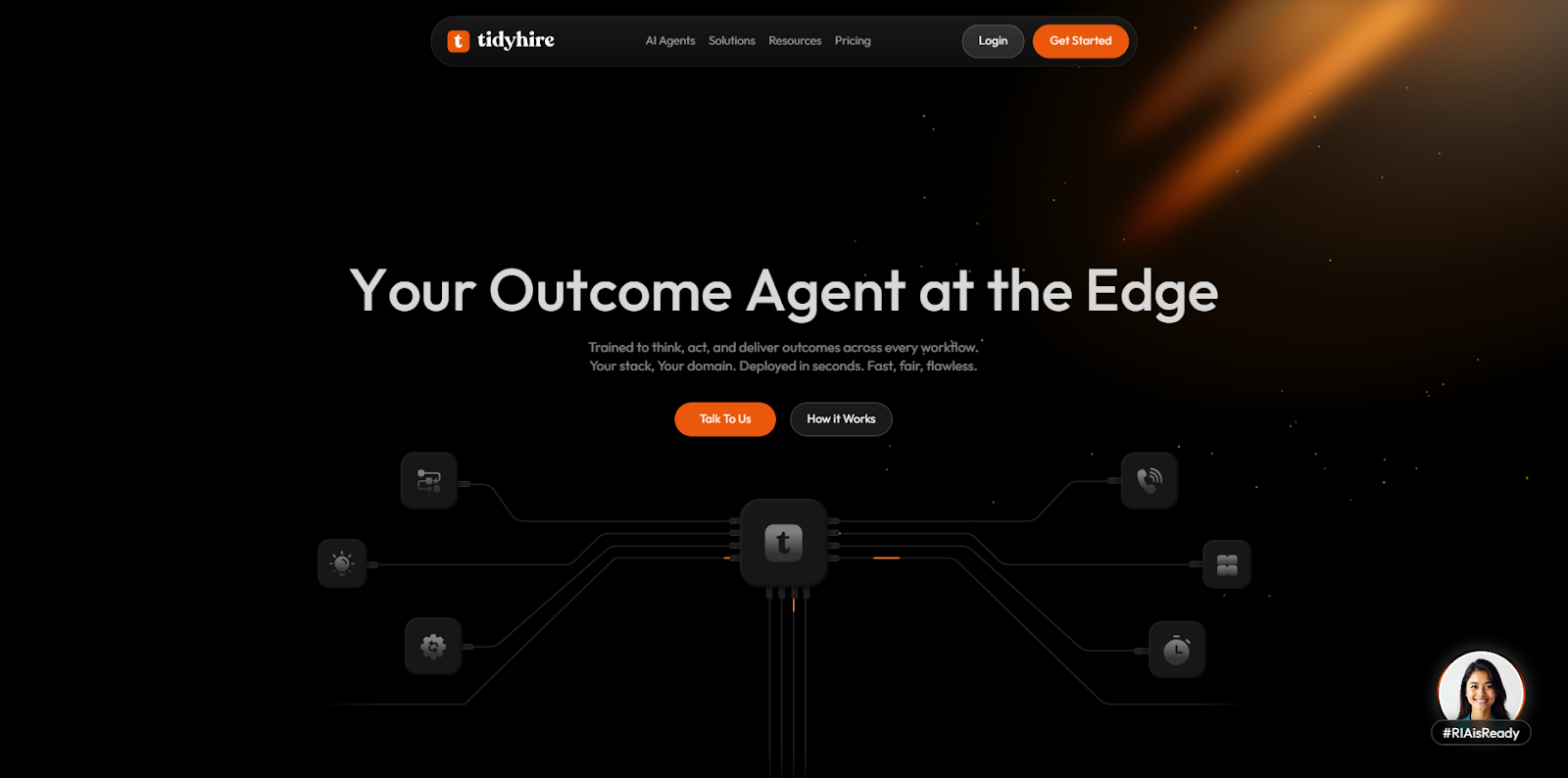
G2 rating: 4.9 out of 5
Tidyhire takes the first spot on our list of top conversational AI platforms. It is built for enterprises that want intelligent voice-first automation across sales, recruitment, and customer support. The Recruitment Intelligence Agent (RIA) adapts mid-conversation, mapping intent and driving outcomes in real time.
Key Features
- Voice-based AI agent (RIA) with advanced intent mapping
- Real-time decisioning across sales, hiring, and support
- Multilingual communication in 32+ languages
- Long-term memory engine for contextual conversations
- 300+ workflow integrations for end-to-end automation
Pricing: Starts at $99/month DIY plan
2. Amazon Lex
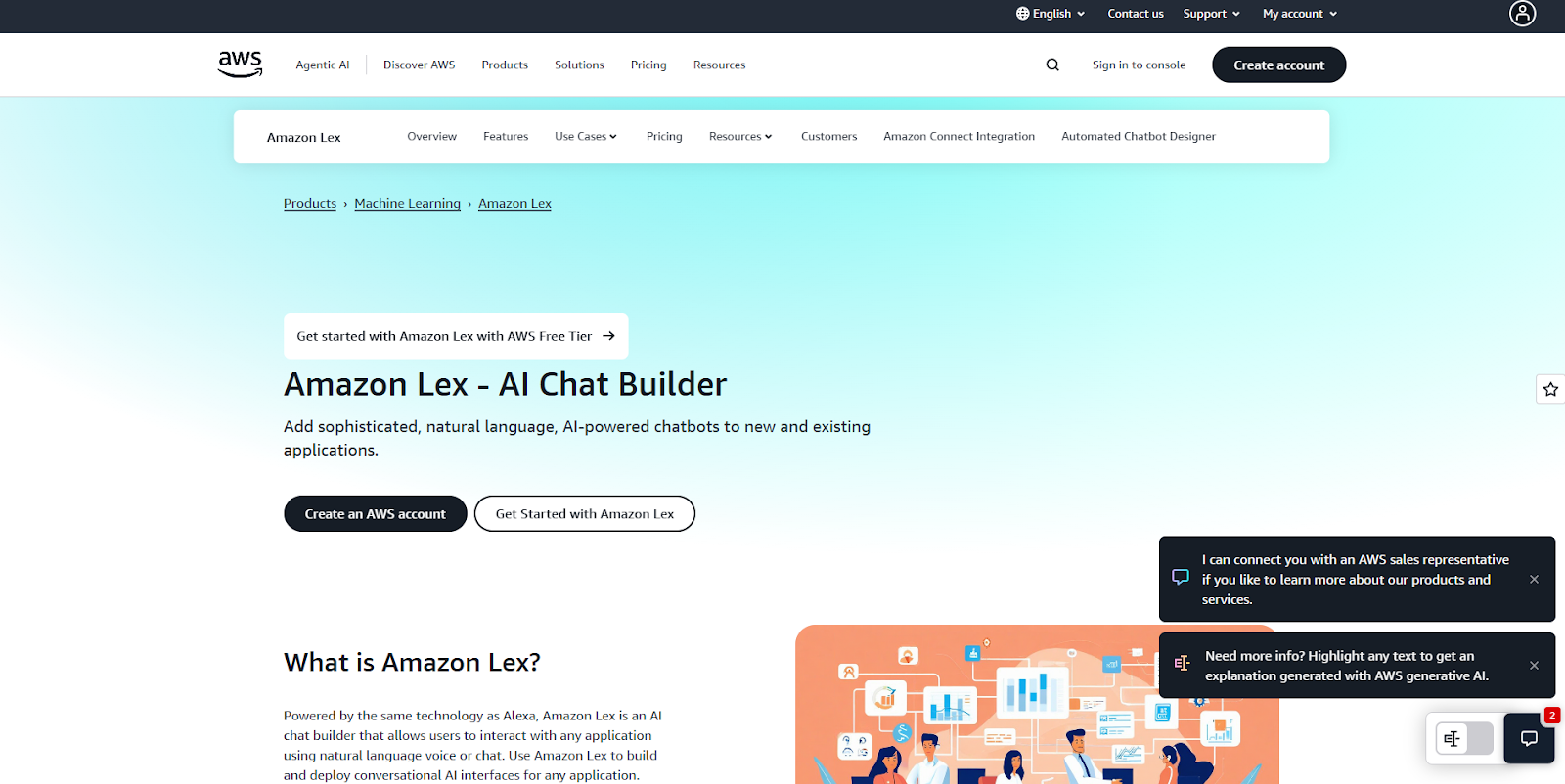
G2 Rating: 4.2 out of 5
Amazon Lex brings the power of machine learning to voice and text-based interfaces. As part of the AWS ecosystem, it helps you create scalable conversational tools for customer or candidate engagement without needing extensive infrastructure.
Key Features
- Intent recognition for better automation across multiple languages
- Omnichannel deployment with one-click setup
- AWS integrations for data queries and workflows
Pricing: Example cost- $33.50/month for 8,000 voice + 2,000 text requests
3. IBM Watsonx Assistant
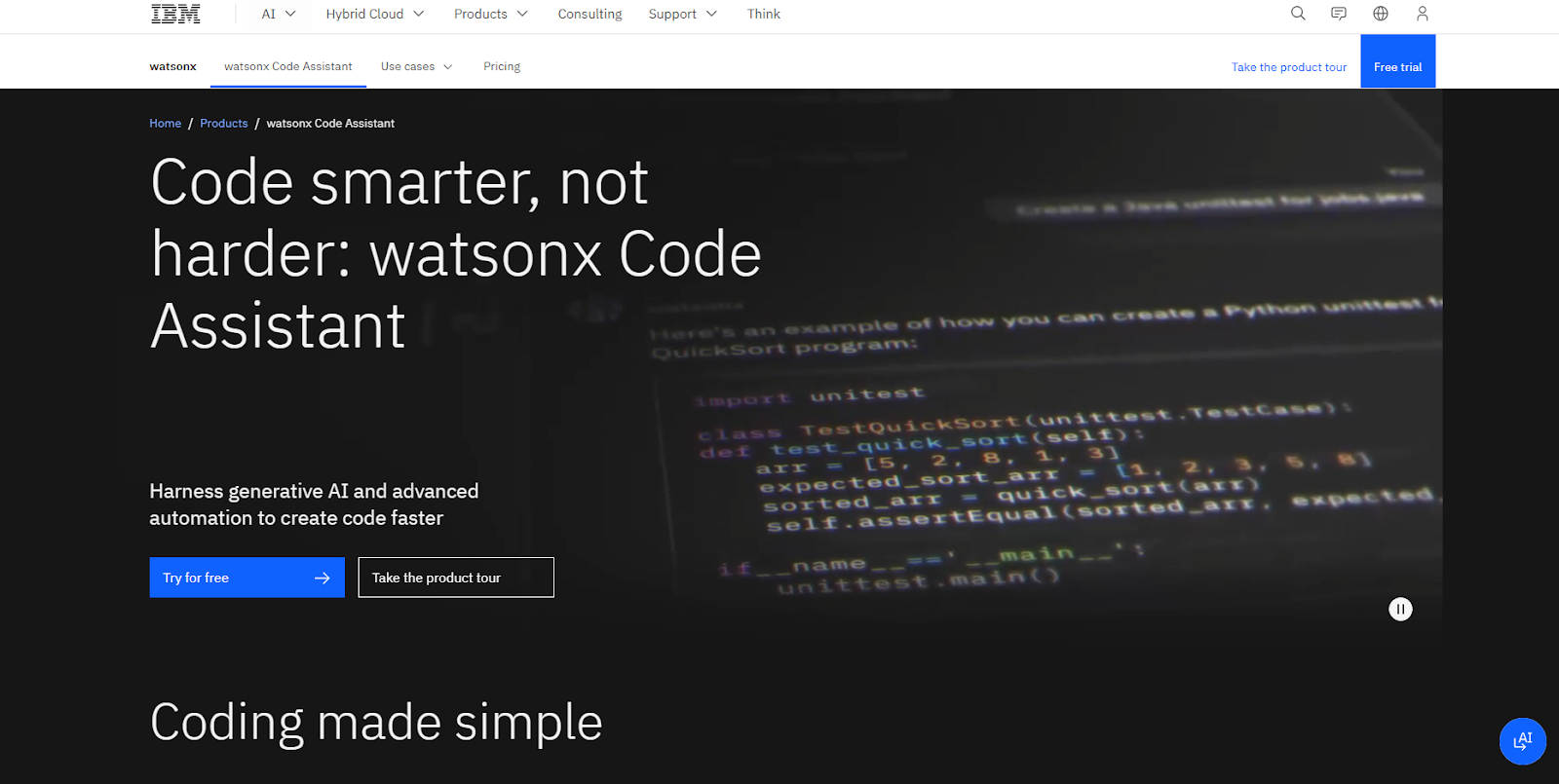
G2 Rating: 4.4 out of 5
IBM Watsonx Assistant helps you build intelligent assistants that improve support experiences and candidate interactions. With advanced reasoning and intent recognition, it can reduce waiting times and improve resolution accuracy across recruitment and business operations.
Key Features
- Transformer-based natural language understanding
- Generative AI-powered conversational search
- Voice interaction across multiple languages
Pricing: Essentials plan starts at approx. $2 per 20 task prompts
4. Boost.ai
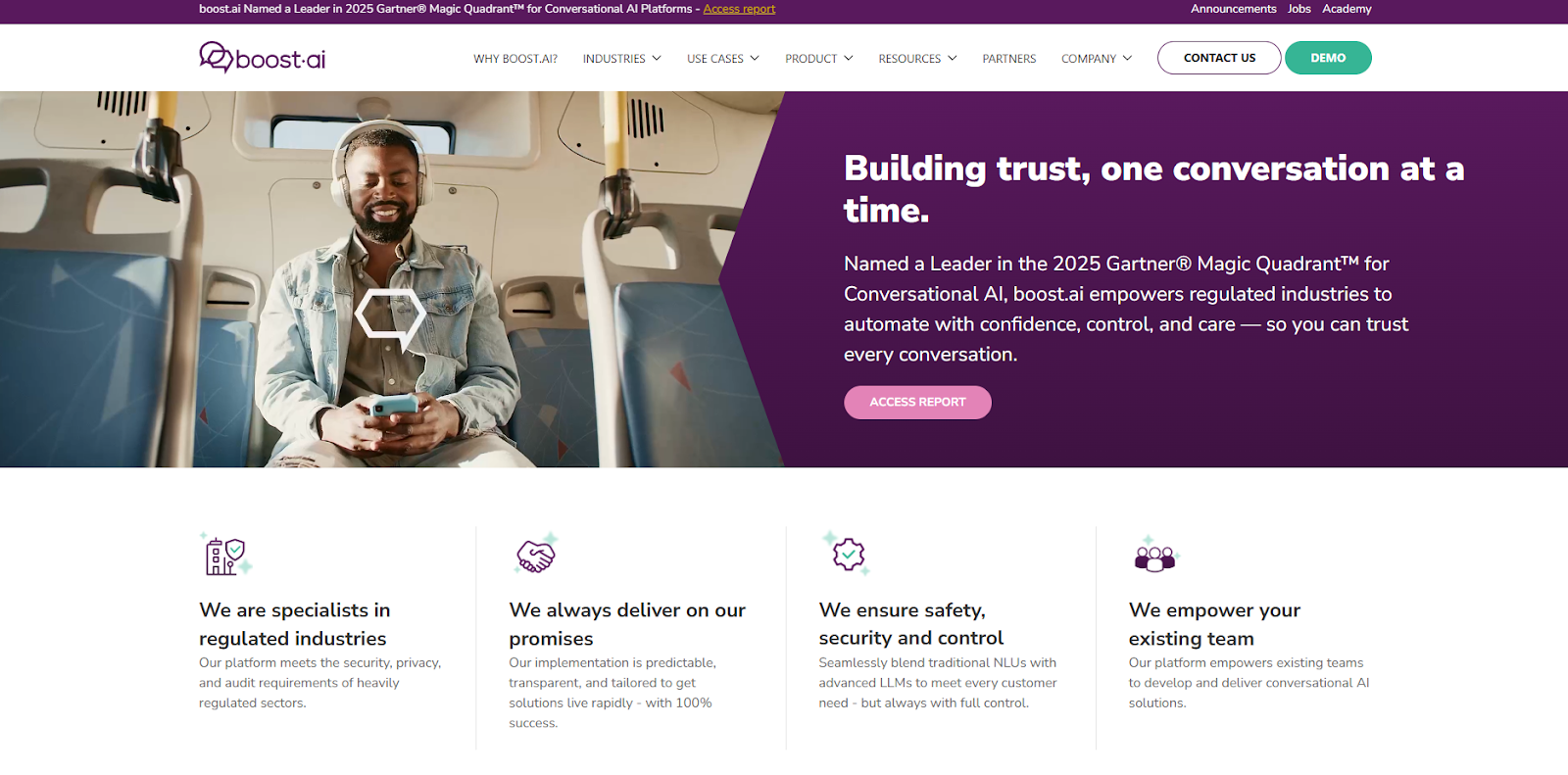
G2 Rating: 4.8 out of 5
Boost.ai has quickly gained traction for delivering hyper-personalised, scalable conversational agents. Its self-learning AI helps you automate high-volume conversations, making it ideal for businesses like staffing agencies and banks that deal with constant queries.
Key Features
- Omnichannel customer engagement
- Scales seamlessly for high-traffic interactions
- 24/7 customer support automation
Pricing: Available on request
5. Kore.ai
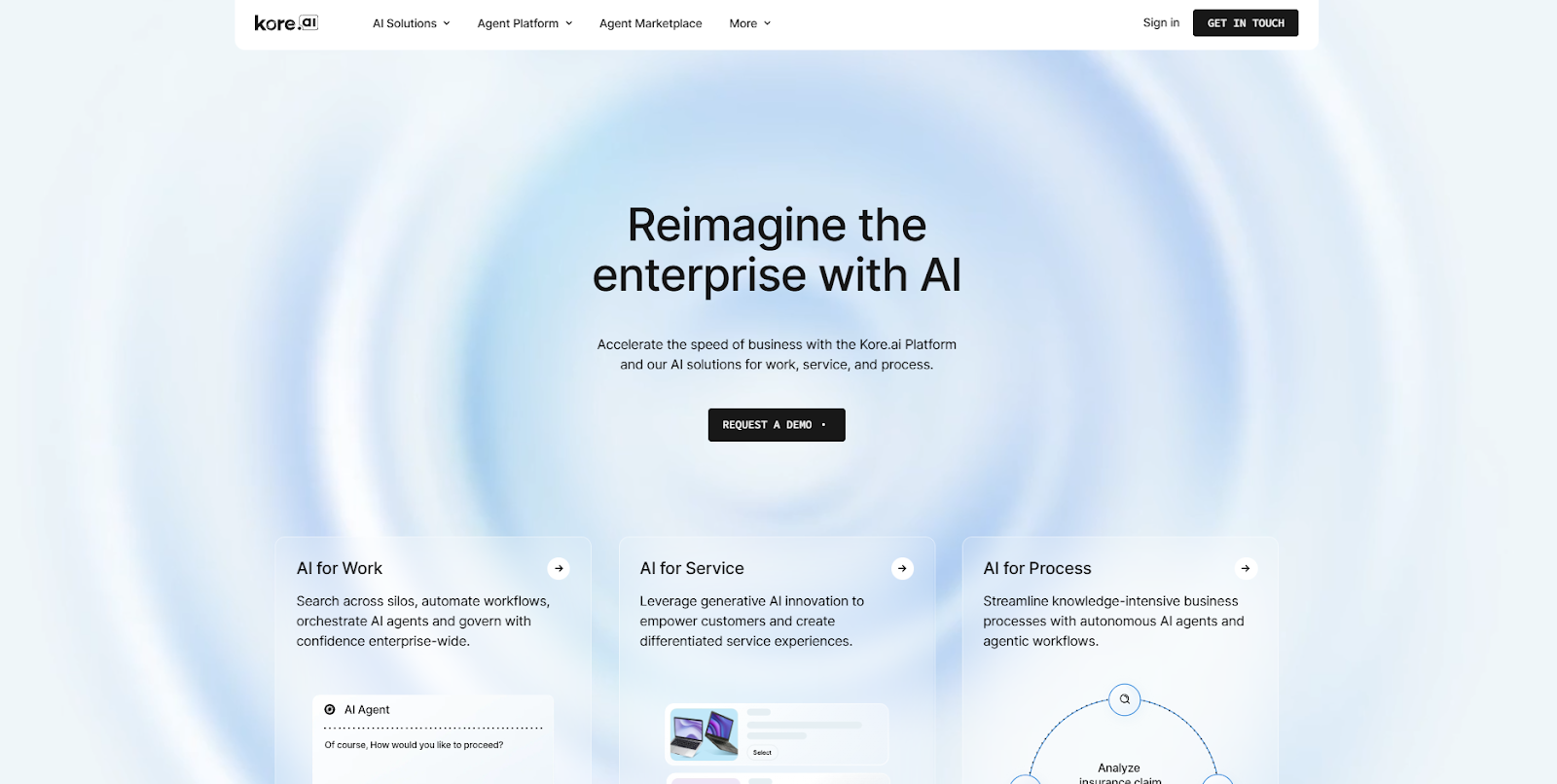
G2 Rating: 4.7 out of 5
Kore.ai offers a versatile conversational AI platform with strong no-code and low-code options. For recruiters and HR teams, it simplifies candidate communication while ensuring compliance and security, particularly valuable in regulated sectors like healthcare and finance.
Key Features
- Pre-built industry bots and workflow templates
- Support for 120+ languages and channels
- Model-agnostic flexibility across LLMs
Pricing: Available on request
6. Cognigy
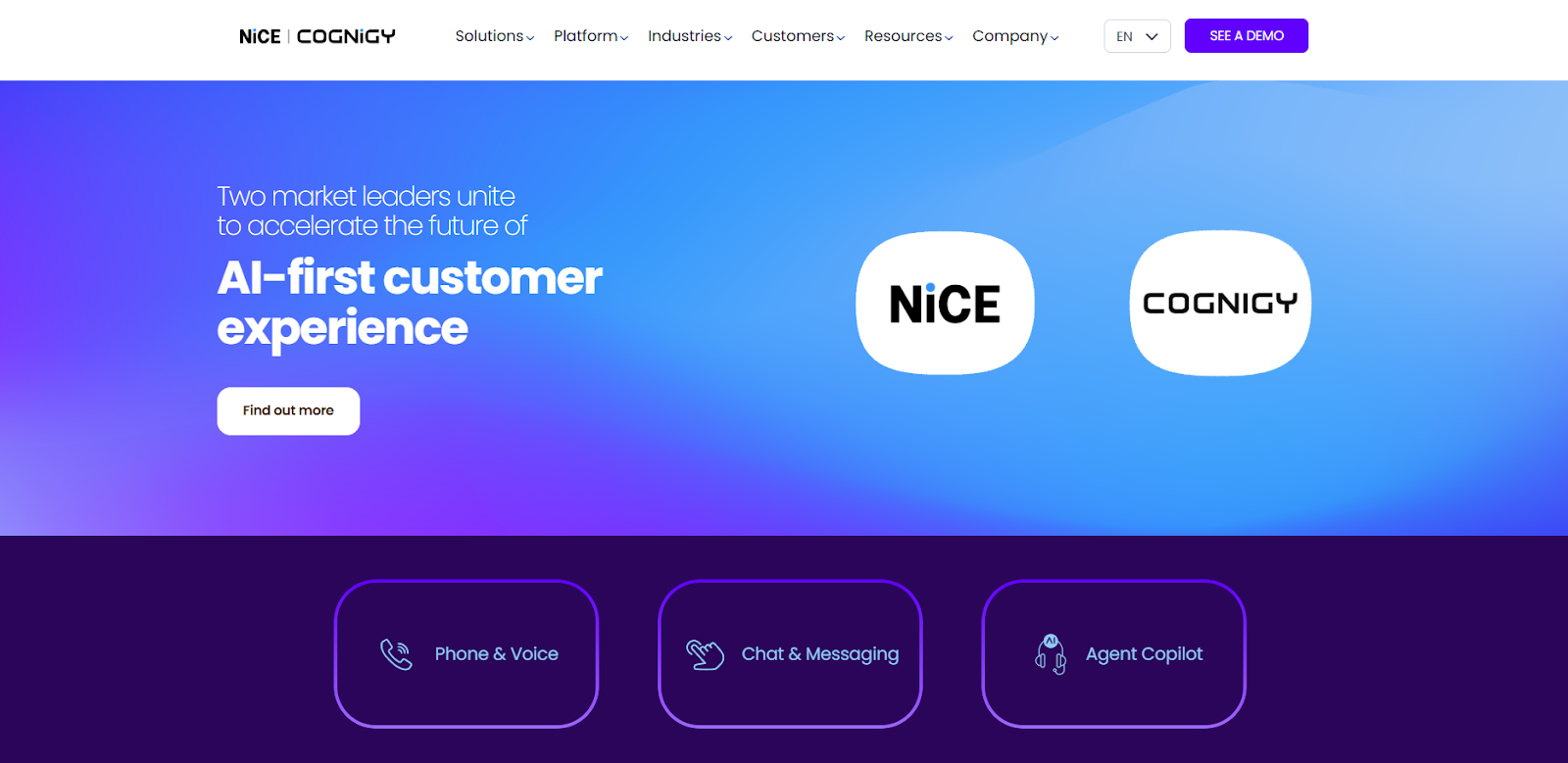
G2 Rating: 4.6 out of 5
Cognigy.AI specialises in enterprise-grade virtual agents that work across channels and languages. Its generative AI capabilities make it a solid option if you want to scale customer or candidate conversations with efficiency and empathy.
Key Features
- Omnichannel and multimodal self-service
- AI-powered Agent Copilot for team productivity
- Hyper-realistic voice interactions
Pricing: Usage-based billing, available on request
7. Amelia
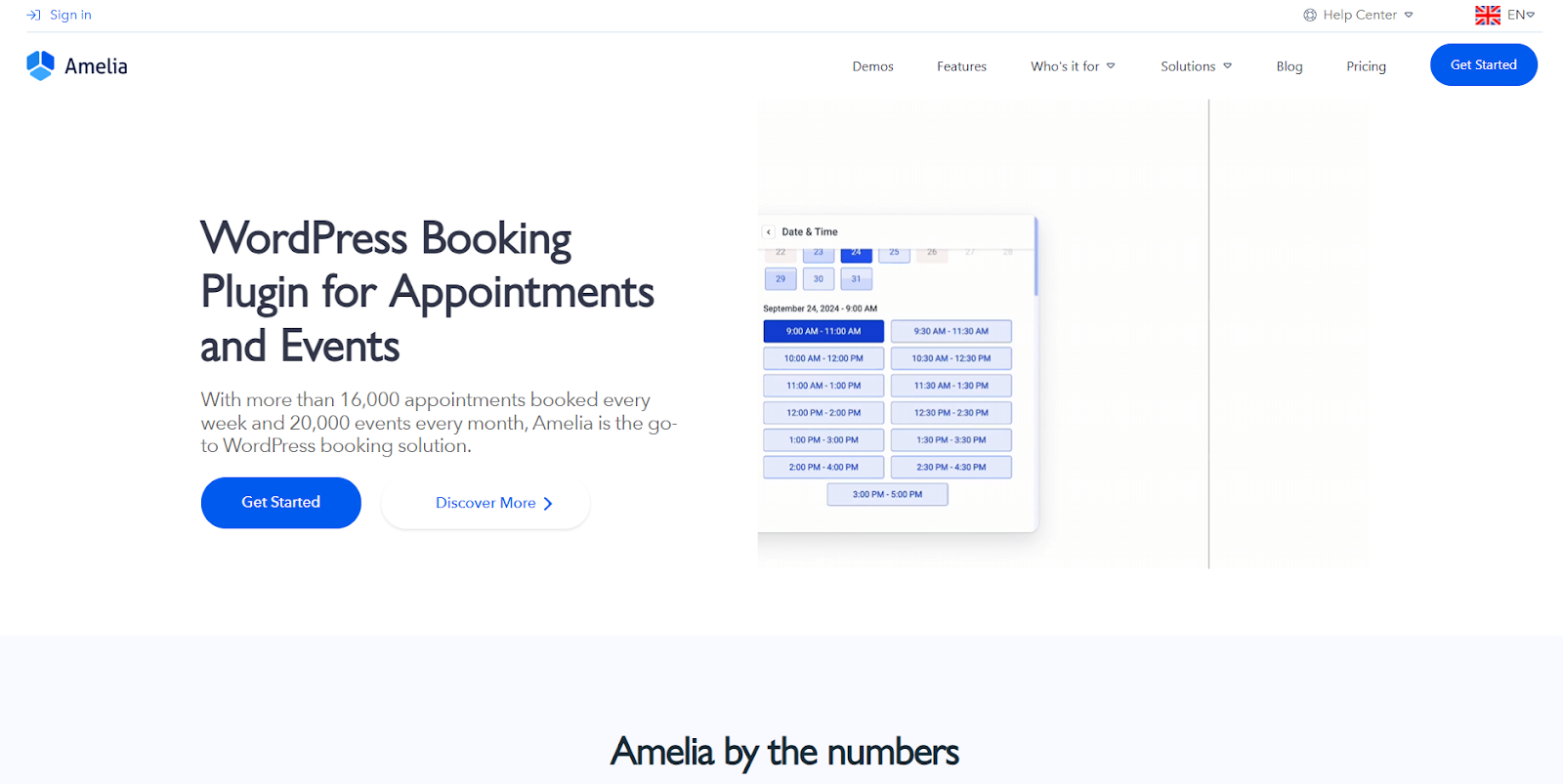
G2 Rating: 4.4 out of 5
Amelia focuses on full-service automation, handling both customer-facing and employee-facing workflows. For recruitment teams, this means less manual effort as Amelia automates repetitive queries while ensuring more meaningful candidate engagement.
Key Features
- AI-powered answer engine from existing knowledge bases
- End-to-end task automation with action agents
- Pre-built content packs for rapid deployment
Pricing: Available on request
8. LivePerson
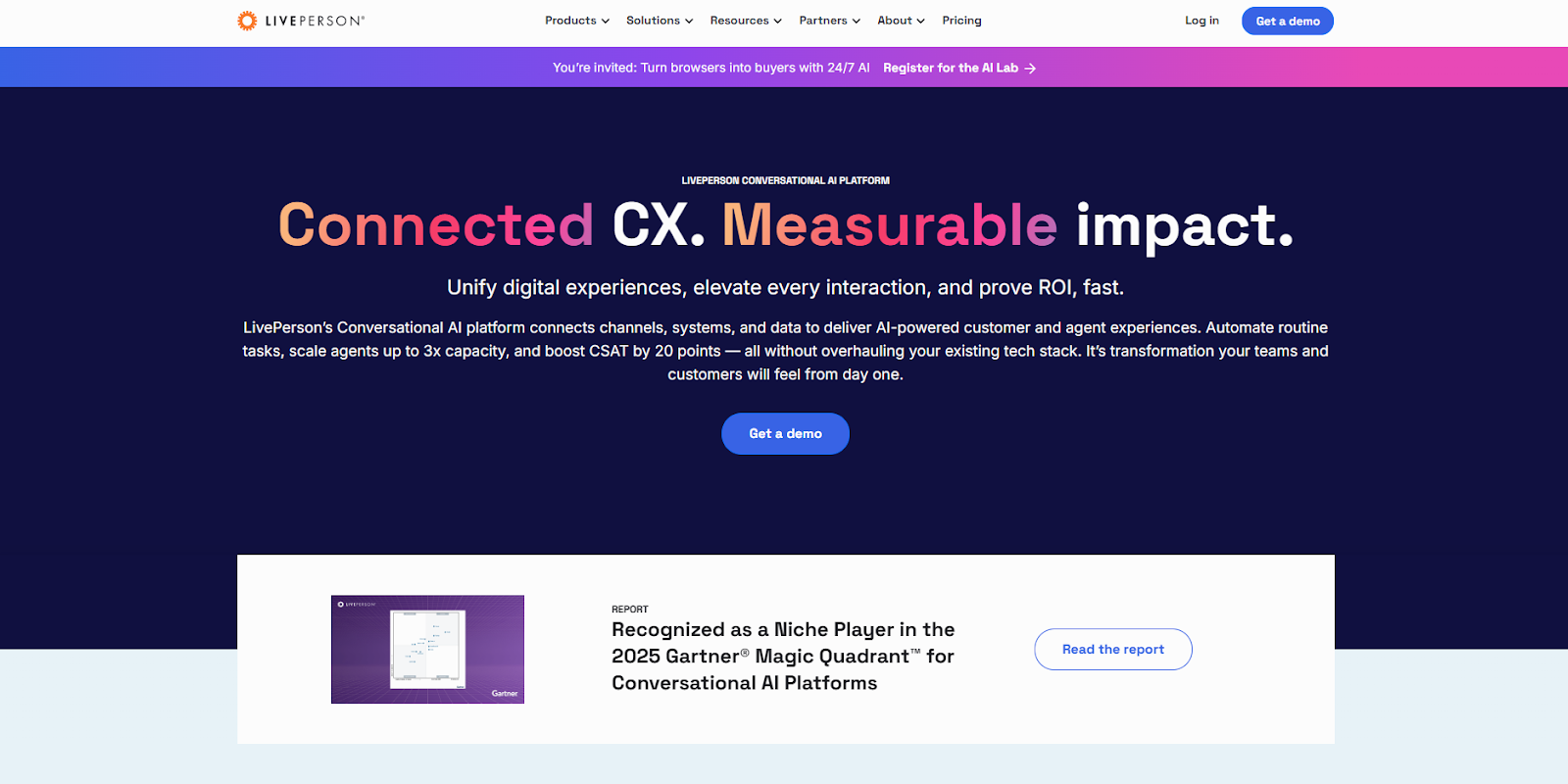
G2 Rating: 4.3 out of 5
LivePerson is a favourite among enterprises for managing customer conversations at scale. With AI-powered intent recognition, the tool helps you automate routine queries while supporting live agents for more strategic conversations.
Key Features
- Real-time intent management with analytics
- No-code conversation builder
- CRM and scheduling integrations
Pricing: Quote-based, available on request
9. Google Cloud Dialogflow
G2 Rating: 4.4 out of 5
Google Cloud Dialogflow is one of the most recognised names in conversational AI. Its prebuilt agents and deep Google integrations make it easy to set up conversational workflows for recruitment and customer interactions alike. It’s a solid option among the top conversational AI platforms to explore in 2025.
Key Features
- Gemini model-powered adaptive responses
- Prebuilt agents for rapid deployment
- Seamless Google Cloud integrations
Pricing: Free tier available; text with generative AI at $0.012/request
10. ChatGPT
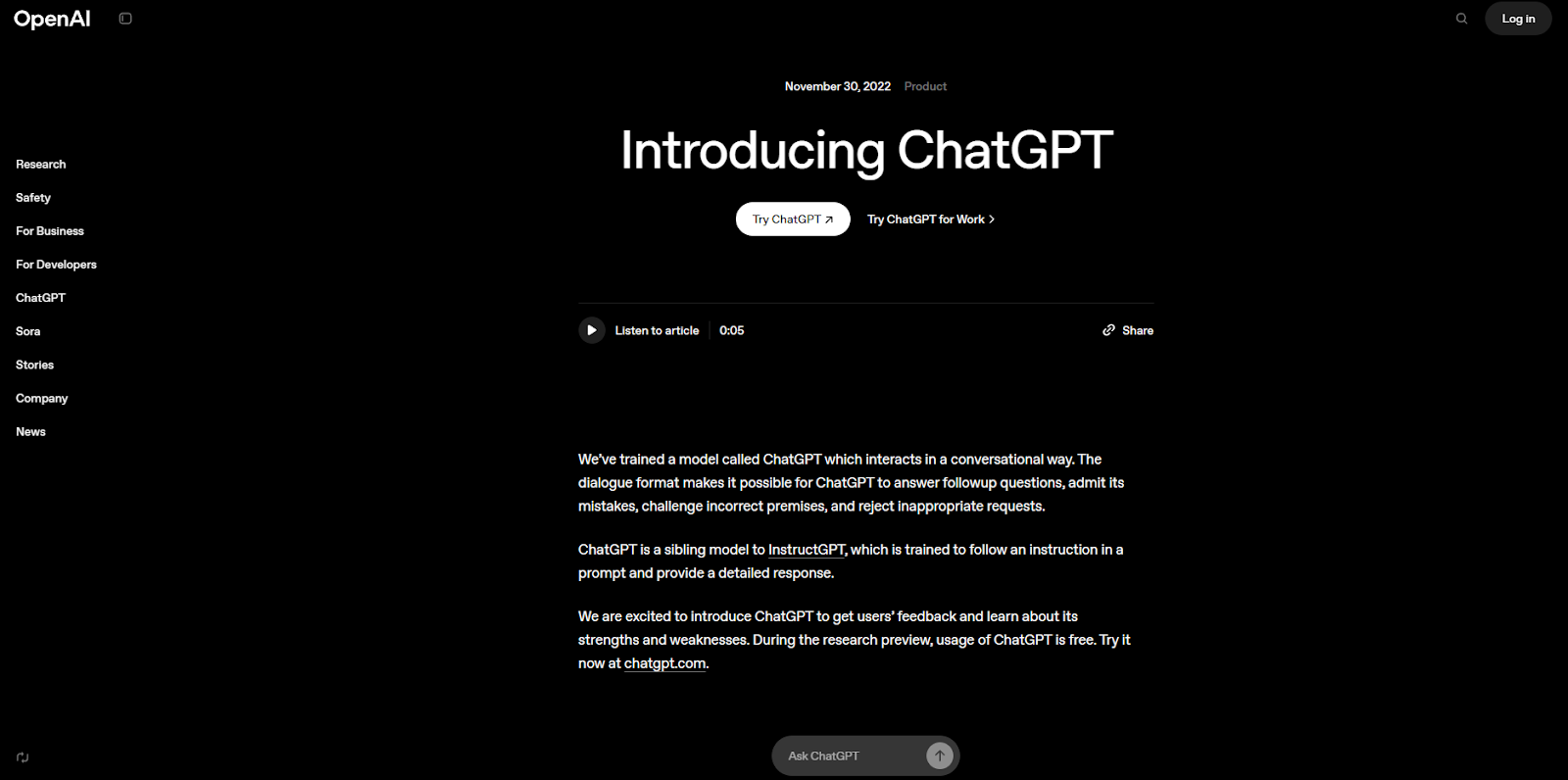
G2 Rating: 4.7 out of 5
Last but not least, ChatGPT continues to dominate the conversational AI space. From candidate screening to personalised communication, it’s highly adaptable and supports recruiters with both creative and operational needs.
Key Features
- Advanced natural language understanding
- Multilingual support in 50+ languages
- Personalised, context-aware responses
Pricing: Free version available; Plus plan starts at $20/month
Also Read: Conversational AI Recruiting Assistant for Better Hiring
How Do You Select The Best Conversational AI Tool?
With so many options available, selecting the best conversational AI platform means balancing features with practical needs.
Evaluate Platform Capabilities
Check whether the platform supports advanced NLP, contextual conversations, and generative AI. Strong intent detection is essential for accurate query handling.
Review Security and Ethics
Always assess ethical safeguards. Responsible AI includes bias monitoring, clear datasets, and privacy frameworks that match industry regulations.
Test Usability
Your recruiters and managers should be able to use the system without technical barriers. Low-code or no-code builders simplify adoption for non-technical teams.
Assess Conversational Quality
Focus on how natural the responses sound, how well the system avoids inaccuracies, and whether it adapts from past interactions.
Measure Scalability and Integrations
The right platform should grow with you. Verify that it integrates across channels and supports enterprise-wide deployment without adding complexity.
Validate Real-World Performance
Ask vendors for live use cases, performance benchmarks, and client references. Proof of success in your industry reduces risks before investing.
Summing Up
Choosing among the top conversational AI platforms comes down to clarity on your needs, budget, and long-term goals. Making the right choice depends on aligning features like intent detection, multilingual support, and integrations with your business priorities. By following the factors we discussed, you can identify a platform that not only improves customer conversations but also scales with your operations.
For businesses that want more than chat-based automation, Tidyhire stands out with its enterprise-grade voice AI, RIA. From qualifying leads and screening candidates to supporting customers in real-time, RIA brings intelligence and adaptability into every conversation across industries.
Ready to see how RIA can simplify your conversations and boost efficiency? Get started with a free Tidyhire demo today and explore how it fits your business needs.
FAQ’s
Which conversational AI is the best?
The best conversational AI depends on your business goals, budget, and industry needs. Platforms like Tidyhire, IBM Watson, and Dialogflow offer strong capabilities, while ChatGPT excels in general conversational use.
How to build your own conversational AI?
To build your own conversational AI, you’ll need natural language processing, intent recognition, and system integration. Developers then customise data training, conversation flows, and deployment to match business needs.
Which AI is best for voice conversation?
Several platforms provide strong voice capabilities, but suitability depends on context and scale. For enterprise-level voice interactions, Tidyhire’s RIA stands out with memory-driven context handling and natural decision-making abilities.
What is the best AI chatbot platform?
There isn’t one universal “best” AI chatbot platform, as suitability varies by use case. For broad knowledge tasks, ChatGPT, Gemini, and Claude remain widely preferred across industries and applications.



